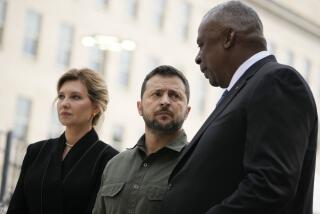Contra Aid Bid of $50 Million Likely : Reagan Request Would Stress Non-Lethal Help
- Share via
WASHINGTON — President Reagan, facing a crucial vote next month on aid to Nicaragua’s Contras, is likely to settle on a sharply reduced figure of roughly $50 million, most of it earmarked for non-lethal equipment, White House officials said Thursday.
The scaled-back amount and the shift away from money designated for weapons reflect the difficult battle the Administration faces in Congress as a result of efforts by Central American leaders to reach a negotiated cease-fire in the war between the Contras and Nicaragua’s Sandinista government.
One White House official conceded that the Administration, which originally had planned to seek $270 million, will drastically cut its request after being “forced into it by the circumstances” in Central America and in Congress.
Recommendation Due Today
Others cautioned that arguments still are being made in the White House for sums above and below $50 million and that the figure could change. A senior White House official said that the staff will present a recommendation to the President today.
White House officials said they are trying to determine the minimum amount needed to sustain the rebels for several months while the Administration tries to determine whether a cease-fire will take place.
“People are looking at what you really need to provide the support” for the Contras, a senior White House official said, speaking on condition of anonymity. “You don’t have to buy trouble for yourself” by seeking more than is needed or than can be obtained.
“We will be tailoring our request to maintain the Contras as a viable force with as much humanitarian aid as possible and as little lethal aid as possible,” White House spokesman Marlin Fitzwater said.
The Administration maintains that the Nicaraguan government will renege on its agreements to make democratic reforms if the Contras dissipate as a military threat, while others contend that the U.S. military aid is undercutting the regional peace process.
Reagan has said that the majority of the assistance he will seek for the Contras would be non-lethal--”food, clothing, to keep them up and going,” one official said.
Mostly Ammunition
“The weapons are there,” the official said, adding that the military component would be mostly ammunition.
The President will make a plea for Contra aid during his State of the Union address Monday evening, but he is not expected to reveal the amount of the request until he formally seeks the money from Congress on Tuesday or Wednesday, a senior White House official said.
The House is scheduled to vote on the request Feb. 3 and the Senate on Feb. 4, with no amendments allowed. The legislation must be approved by both bodies to take effect.
“If you lose one, you can’t go back (seeking a lesser amount), and if you lose, basically, that’s the end of the resistance,” said a White House official. “They’d lose an awful lot of momentum and it would be a terrible morale blow.”
As the Administration scales up a lobbying campaign intended to persuade wavering members of the House and Senate to continue the hotly debated assistance program, Sandinista leaders have unveiled a series of reforms. These are intended to demonstrate compliance with the five-month-old peace agreement reached by the presidents of Costa Rica, El Salvador, Guatemala, Honduras and Nicaragua.
Joining Political System
On Thursday, the Sandinistas said they would be willing to permit supplies of humanitarian aid from the United States to reach the Contras, through an international organization, if the rebels accept a cease-fire. The Nicaraguan government also said that it is willing to allow the Contras to establish a new political party or join existing parties for purposes of entering elections.
The proposal appeared to catch the Reagan Administration by surprise, and the White House had no comment.
In another development, intelligence sources disclosed in Washington that Soviet aid to the Sandinistas in 1987 totaled 21,700 tons of military materiel in 62 shipments--roughly equivalent in size to the record 21,900 tons believed shipped to Nicaragua in 1986.
Included were more than 50 surface-to-air missiles, more than 80 mobile anti-aircraft guns, 30 armored reconnaissance vehicles, 30 armored personnel carriers and seven attack and transport helicopters known by the designation Hind and Hip in the West. The shipments also included “a large amount” of guns and ammunition, an intelligence source said.
Times staff writer John M. Broder contributed to this story.
More to Read
Sign up for Essential California
The most important California stories and recommendations in your inbox every morning.
You may occasionally receive promotional content from the Los Angeles Times.













